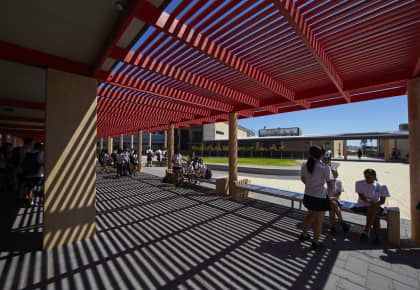Student health care
Student health care
You will be asked to provide your child’s health information to help the school meet your child’s health needs.
You will be asked to:
- provide your child’s Australian Immunisation Register (AIR) immunisation history statement
- complete a Health Care Summary form with details about health care needs and information to use in a medical emergency
- complete Management and Emergency Response Plans where the Health Care Summary indicates your child needs support at school.
If your child’s medical needs are complex, you can arrange a meeting with the school.
View immunisation enrolment requirements on How to enrol – A step by step guide.
Students in Year 7 and 10 can take part in the school-based immunisation program. The program aims to protect against vaccine-preventable diseases.
The Department of Health website, Healthy WA, has more information about the school-based immunisation program. This includes:
- vaccine information in up to 21 different languages
- options for students to catch up on an immunisation they may have missed at school.
Parents must provide consent for their child to receive vaccinations at school. Register and provide consent online at VaccinateWA.
A Management and Emergency Response Plan provides your child’s school with information they need to respond to specific medical needs. The plan outlines:
- a daily management plan
- an emergency response plan
- staff training requirements
- medication instructions such as dosage, storage and when it needs to be taken
- your authority to act.
Management and Emergency Response Plans may need to have a signature from your child’s medical practitioner.
It is important to ensure the plan is in place as soon as possible. You should also review the plan each year or as your child’s needs change.
Types of plans
Management and Emergency Response Plan templates are available for common conditions, such as:
- severe allergy/anaphylaxis
- minor and moderate allergies
- diabetes
- seizure
- asthma
- activity of daily living
- emergency response plan for students with special needs
- generic health care (for all other conditions).
If your child needs to be given medication during school hours, you need to provide:
- medication that is labelled with your child’s name, in its original packaging and is within expiry
- written authorisation for the school to administer the medication.
This applies to medication for long-term and short-term use.
If your child needs medical equipment at school, it is important to ensure you supply the equipment in good working order.
Schools have a responsibility to ensure head lice is not spread throughout the school. If the school suspects a child has head lice, it may exclude the child from attending school until treatment has commenced. Your child may return to school when all live head lice have been removed.
Visit the Department of Health website, HealthyWA, to find out about treating head lice.
It is important that you maintain communication with your child’s school, and advise of any changes or concerns you may have.
Schools manage student health care in line with the Student Health Care in Public Schools policy and procedures.





